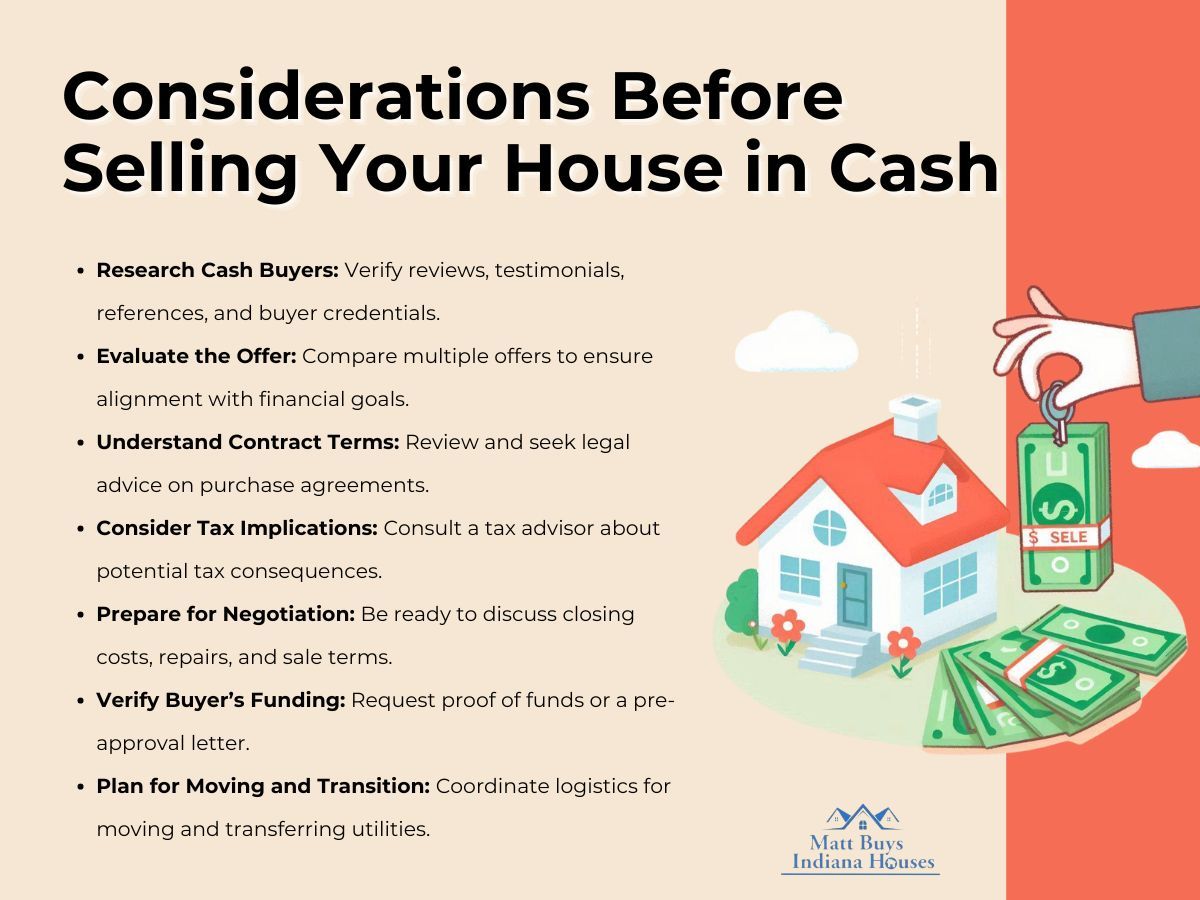Step by Step: What Happens After You Decide to Sell Your House for Cash?
July 9, 2024
Selling your house for cash provides a straightforward path to a quick and efficient transaction, offering distinct advantages over traditional selling methods. This comprehensive guide takes you through every step of the process—from the initial contact with cash buyers to receiving your payment.
Discover the benefits of choosing a cash sale, important considerations before making your decision, and practical tips for navigating negotiations and closing. Whether you're facing time constraints, seeking financial flexibility, or simply prefer a hassle-free sale, this guide equips you with the knowledge to achieve your selling goals effectively.
What Happens After You Decide to Sell Your House for Cash?
Deciding to sell your house for cash can be a liberating choice, especially if you're looking for a quick and streamlined sale. After you make this decision, several key steps occur, each important for a successful transaction.

1. Initial Contact and Inquiry
The process begins with your decision to explore cash offers for your home. You can reach out to cash buyers directly, often through their websites or contact numbers. Many companies specialize in purchasing homes for cash and are experienced in handling quick transactions.
2. Property Evaluation
Once you make initial contact, the cash buyer will schedule a visit to assess your property. This evaluation is crucial for them to determine the home's condition, size, location, and any necessary repairs or renovations. Unlike traditional buyers, cash buyers often accept homes in various conditions, saving you the hassle of extensive preparations.
3. Cash Offer Presentation
Based on the property evaluation, the cash buyer will present you with a cash offer. This offer typically takes into account the current market value of similar properties, the condition of your home, and any repairs needed. Cash offers are generally less than what you might expect from a traditional sale, but they compensate for the speed and convenience of the transaction.
4. Acceptance of Offer
If you find the cash offer acceptable, you can proceed to accept it. Cash buyers are usually prepared to move quickly, so this step can often be completed within a few days. Unlike traditional sales that involve waiting for mortgage approvals or lengthy negotiations, a cash sale can close in as little as a week, depending on your readiness.
5. Contract Signing and Escrow
Upon accepting the offer, you and the cash buyer will sign a purchase agreement. This contract outlines the terms of the sale, including the sale price, any contingencies, and the timeline for closing. In many cases, cash buyers use an
escrow company to handle the transaction. Escrow ensures that all conditions are met before the funds are released, providing security and transparency for both parties.
6. Home Inspection and Appraisal (if necessary)
While cash sales often skip the traditional appraisal process, some buyers may opt for an inspection to ensure there are no hidden issues with the property. This step, if required, usually occurs shortly after the contract signing.
7. Closing the Sale
Once all conditions are satisfied, the sale is finalized at a closing meeting. At this meeting, you will sign the final paperwork and transfer ownership of the property to the cash buyer. The funds from the sale will be disbursed, typically through
wire transfer, ensuring a quick and seamless transaction.
8. Vacating the Property
After the sale closes, you will need to vacate the property as per the agreed-upon timeline. This allows the new owners to take possession promptly. Cash sales often involve flexible move-out dates, accommodating your schedule, and easing the transition.
9. Enjoying the Benefits
Selling your house for cash offers several benefits, including speed, convenience, and certainty. You avoid the uncertainties and delays associated with traditional sales, making it an ideal option for those needing to sell quickly or simplify the process.
By following these steps, you can navigate the process smoothly and efficiently, ensuring a fast sale with minimal stress. Whether you're facing a time-sensitive move or simply prefer a hassle-free transaction, cash sales provide a viable alternative to traditional real estate transactions
Benefits of Selling Your House for Cash
Selling your house for cash offers numerous advantages that can make the process smoother and more beneficial compared to traditional real estate transactions. Here are some key benefits:
1. Speed of Sale
One of the most significant benefits of selling your house for cash is the speed of the transaction. Cash sales typically close much faster than traditional sales that rely on mortgage approvals and inspections. In many cases, you can have a cash offer within days and close the sale within a week or two, which is ideal if you need to sell your house quickly due to relocation, financial reasons, or other urgent matters.
2. Certainty and Reliability
Cash sales provide a high level of certainty and reliability for both parties involved. Unlike traditional sales where deals can fall through due to financing issues or appraisal discrepancies, cash sales are less likely to face such complications. Once an offer is accepted, you can be more confident that the sale will proceed smoothly to closing.
3. Convenience and Simplicity
Selling your house for cash is often much simpler and more convenient compared to traditional sales. You can bypass the complexities of listing your home, staging it for showings, and negotiating with multiple buyers.
Cash buyers are typically investors or companies that specialize in quick transactions, so they are accustomed to handling the paperwork and details efficiently.
4. Fewer Costs and Fees
Cash sales can potentially save you money on various costs and fees associated with traditional real estate transactions. Since you are not paying real estate agent commissions (if you choose to sell directly to a cash buyer), you can retain more of the sale proceeds. Additionally, there may be fewer closing costs and no appraisal fees required for cash transactions, further reducing your expenses.
5. Flexibility with Property Condition
Cash buyers often purchase properties in their current condition, which means you may not need to invest time and money in repairs or renovations before selling. This is particularly advantageous if your house requires significant maintenance or updates that you prefer not to undertake before selling.
6. Avoiding Foreclosure or Distress Situations
For homeowners facing
foreclosure or financial distress, selling their house for cash can be a lifeline. Cash sales provide a way to quickly sell the property and avoid foreclosure proceedings, which can have long-term financial repercussions. It allows homeowners to settle debts, eliminate mortgage payments, and move on with a fresh start.
7. Reduced Stress and Uncertainty
The streamlined nature of cash sales can significantly reduce the stress and uncertainty often associated with selling a home. You can avoid the emotional roller coaster of multiple showings, prolonged negotiations, and potential buyer backing out at the last minute. Instead, you can focus on a straightforward transaction and plan your next steps with confidence.
Whether you're looking to sell quickly, avoid the hassles of traditional real estate transactions, or handle a challenging financial situation, a cash sale can be a practical and effective solution. It's important to weigh these benefits against your specific circumstances and goals when deciding the best approach to sell your home.
Additional Considerations Before Selling Your House in Cash
Before selling your house for cash, it's crucial to consider a few additional factors to ensure the process meets your expectations and needs:

1. Research Cash Buyers
Not all
cash buyers or real estate investors operate with the same level of professionalism or integrity. Take the time to research potential buyers thoroughly. Look for reviews, testimonials, and references from previous sellers. Verify the buyer’s credentials and ensure they have a solid track record of completing transactions successfully.
2. Evaluate the Offer
While cash offers can be appealing due to their speed and convenience, they often come at a discount compared to market value. Evaluate the cash offer carefully to ensure it aligns with your financial goals and expectations. Consider obtaining multiple offers if possible to compare terms and maximize your return
3. Understand Contract Terms
Review the purchase agreement or contract thoroughly before signing. Pay attention to important details such as the purchase price, closing date, any contingencies, and responsibilities of both parties. If necessary, seek legal advice to clarify any ambiguous terms or ensure your interests are protected
4. Consider Tax Implications
Selling a house for cash may have tax implications depending on your circumstances and the profit from the sale. Consult with a tax advisor to understand the potential tax consequences, such as capital gains taxes or exemptions, and how they may impact your financial situation.
5. Prepare for Negotiation
Even in a cash sale, there may be room for negotiation, especially regarding closing costs, repairs, or specific terms of the sale. Be prepared to negotiate with the buyer to achieve a mutually beneficial agreement. Clearly communicate your preferences and priorities during the negotiation process.
6. Verify Buyer’s Funding
Ensure that the cash buyer has the necessary funds readily available to complete the purchase. Request proof of funds or a pre-approval letter from their financial institution to verify their ability to proceed with the transaction smoothly and without delays
7. Plan for Moving and Transition
Once the sale is finalized, you’ll need to plan for moving out of the property. Coordinate logistics such as packing, hiring movers if needed, and transferring utilities and services to your new residence. Ensure you have a timeline in place to smoothly transition out of the property after closing.
By researching buyers, evaluating offers, understanding contract terms, considering tax implications, preparing for negotiation, verifying funding, and planning for the transition, you can navigate the cash sale process effectively. Taking these additional considerations into account will help ensure a successful and satisfactory transaction that meets your goals as a seller.
Summary
Selling your house for cash provides a rapid and reliable alternative to traditional methods. This guide covers the entire process: from initial contact with cash buyers to evaluating offers, negotiating terms, and finalizing the sale.
Discover the benefits of a streamlined transaction, including avoiding repairs, minimizing costs, and accelerating the closing timeline. Consider essential steps like researching buyers, understanding contract terms, and planning for a smooth transition. By following these steps, you can navigate the cash sale process effectively, achieving your selling goals with efficiency and confidence.











